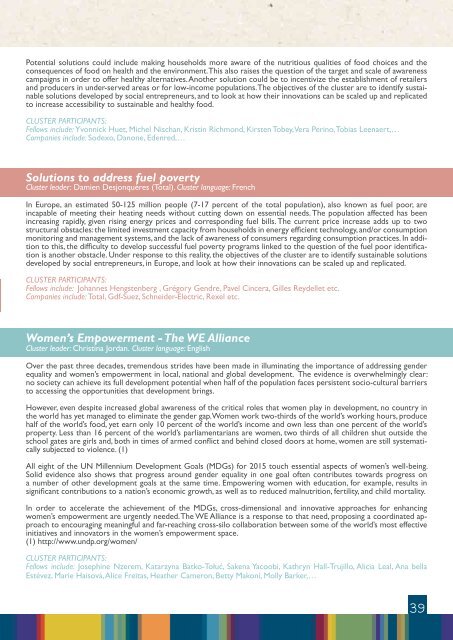Speakers - Ashoka
Speakers - Ashoka
Speakers - Ashoka
Create successful ePaper yourself
Turn your PDF publications into a flip-book with our unique Google optimized e-Paper software.
Potential solutions could include making households more aware of the nutritious qualities of food choices and the<br />
consequences of food on health and the environment. This also raises the question of the target and scale of awareness<br />
campaigns in order to offer healthy alternatives. Another solution could be to incentivize the establishment of retailers<br />
and producers in under-served areas or for low-income populations. The objectives of the cluster are to identify sustainable<br />
solutions developed by social entrepreneurs, and to look at how their innovations can be scaled up and replicated<br />
to increase accessibility to sustainable and healthy food.<br />
CLUSTER PARTICIPANTS:<br />
Fellows include: Yvonnick Huet, Michel Nischan, Kristin Richmond, Kirsten Tobey, Vera Perino, Tobias Leenaert,…<br />
Companies include: Sodexo, Danone, Edenred,…<br />
Solutions to address fuel poverty<br />
Cluster leader: Damien Desjonquères (Total). Cluster language: French<br />
In Europe, an estimated 50-125 million people (7-17 percent of the total population), also known as fuel poor, are<br />
incapable of meeting their heating needs without cutting down on essential needs. The population affected has been<br />
increasing rapidly, given rising energy prices and corresponding fuel bills. The current price increase adds up to two<br />
structural obstacles: the limited investment capacity from households in energy effi cient technology, and/or consumption<br />
monitoring and management systems, and the lack of awareness of consumers regarding consumption practices. In addition<br />
to this, the diffi culty to develop successful fuel poverty programs linked to the question of the fuel poor identifi cation<br />
is another obstacle. Under response to this reality, the objectives of the cluster are to identify sustainable solutions<br />
developed by social entrepreneurs, in Europe, and look at how their innovations can be scaled up and replicated.<br />
CLUSTER PARTICIPANTS:<br />
Fellows include: Johannes Hengstenberg , Grégory Gendre, Pavel Cincera, Gilles Reydellet etc.<br />
Companies include: Total, Gdf-Suez, Schneider-Electric, Rexel etc.<br />
Women’s Empowerment - The WE Alliance<br />
Cluster leader: Christina Jordan. Cluster language: English<br />
Over the past three decades, tremendous strides have been made in illuminating the importance of addressing gender<br />
equality and women’s empowerment in local, national and global development. The evidence is overwhelmingly clear:<br />
no society can achieve its full development potential when half of the population faces persistent socio-cultural barriers<br />
to accessing the opportunities that development brings.<br />
However, even despite increased global awareness of the critical roles that women play in development, no country in<br />
the world has yet managed to eliminate the gender gap. Women work two-thirds of the world’s working hours, produce<br />
half of the world’s food, yet earn only 10 percent of the world’s income and own less than one percent of the world’s<br />
property. Less than 16 percent of the world’s parliamentarians are women, two thirds of all children shut outside the<br />
school gates are girls and, both in times of armed confl ict and behind closed doors at home, women are still systematically<br />
subjected to violence. (1)<br />
All eight of the UN Millennium Development Goals (MDGs) for 2015 touch essential aspects of women’s well-being.<br />
Solid evidence also shows that progress around gender equality in one goal often contributes towards progress on<br />
a number of other development goals at the same time. Empowering women with education, for example, results in<br />
signifi cant contributions to a nation’s economic growth, as well as to reduced malnutrition, fertility, and child mortality.<br />
In order to accelerate the achievement of the MDGs, cross-dimensional and innovative approaches for enhancing<br />
women’s empowerment are urgently needed. The WE Alliance is a response to that need, proposing a coordinated approach<br />
to encouraging meaningful and far-reaching cross-silo collaboration between some of the world’s most effective<br />
initiatives and innovators in the women’s empowerment space.<br />
(1) http://www.undp.org/women/<br />
CLUSTER PARTICIPANTS:<br />
Fellows include: Josephine Nzerem, Katarzyna Batko-Tołuć, Sakena Yacoobi, Kathryn Hall-Trujillo, Alicia Leal, Ana bella<br />
Estévez, Marie Haisová, Alice Freitas, Heather Cameron, Betty Makoni, Molly Barker,…<br />
39



